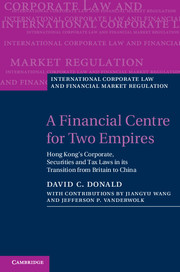 A Financial Centre for Two Empires
A Financial Centre for Two Empires Book contents
- Frontmatter
- Contents
- List of figures
- List of tables
- Preface
- 1 History’s marks on Hong Kong law
- 2 Hong Kong’s economic structure
- 3 Hong Kong corporate and securities laws in response to the Region’s role as China’s international financial centre
- 4 The role of Hong Kong’s tax policies
- 5 Enforcement of corporate and securities law in Hong Kong
- 6 China’s impact on Hong Kong’s position as an international financial centre
- References
- Index
1 - History’s marks on Hong Kong law
From British colony, to Chinese SAR
Published online by Cambridge University Press: 05 June 2014
- Frontmatter
- Contents
- List of figures
- List of tables
- Preface
- 1 History’s marks on Hong Kong law
- 2 Hong Kong’s economic structure
- 3 Hong Kong corporate and securities laws in response to the Region’s role as China’s international financial centre
- 4 The role of Hong Kong’s tax policies
- 5 Enforcement of corporate and securities law in Hong Kong
- 6 China’s impact on Hong Kong’s position as an international financial centre
- References
- Index
Summary
The endowments of an international financial centre
International financial centres, like internationally active trading ports, are outward looking. Their domestic prosperity depends on the ability to attract foreign capital, goods and the deals connected to them. Although the volume of solely domestic transactions may be dwarfed by that of transactions conducted with wholly foreign legs, it is the domestic institutional environment and available skills that draw in these funds, goods and deals. Since its creation in 2007, the Global Financial Centres Index has placed four cities with very different economic and political positions – London, New York, Hong Kong and Singapore – in the top four slots globally. During this period, New York was also the domestic financial centre for the world’s largest economy, while London served a like function for an economy with a ranking between sixth and eighth, and both Singapore and Hong Kong served domestic economies of negligible size whose GDP amounted to barely 10 per cent of the UK’s. Thus, as international financial centres, both London and New York are divided: they are both national financial centres for their large domestic economies (of different sizes) and centres for activity that spans the globe without significant link to either the UK or the US domestic economy. Regardless of whether transactions in these cities are purely domestic, purely foreign or somewhere in between, they are drawn to the financial centre by an economic and institutional condition that reflects the institutional characteristics of the nation itself. In New York, it will be the American economy, institutions and laws, and in London, the corresponding support elements of the UK. The same domestic institutions and laws facilitate both domestic and purely foreign transactions. These respective sets of institutions and laws have developed within the larger context of the nation, received legitimacy from the power of that nation’s state, and yet gained their support for international usage from and among persons based in other countries. While performing very similar functions, Hong Kong and Singapore present a dramatically different origin and composition. They inherited their legal systems from the British Empire, developed their international orientation as trade hubs of the same, and have achieved their status as leading financial centres significantly free of the (lacking) dimension of their domestic economies (which themselves are composed in good part of international financial services).
- Type
- Chapter
- Information
- A Financial Centre for Two EmpiresHong Kong's Corporate, Securities and Tax Laws in its Transition from Britain to China, pp. 1 - 53Publisher: Cambridge University PressPrint publication year: 2014


